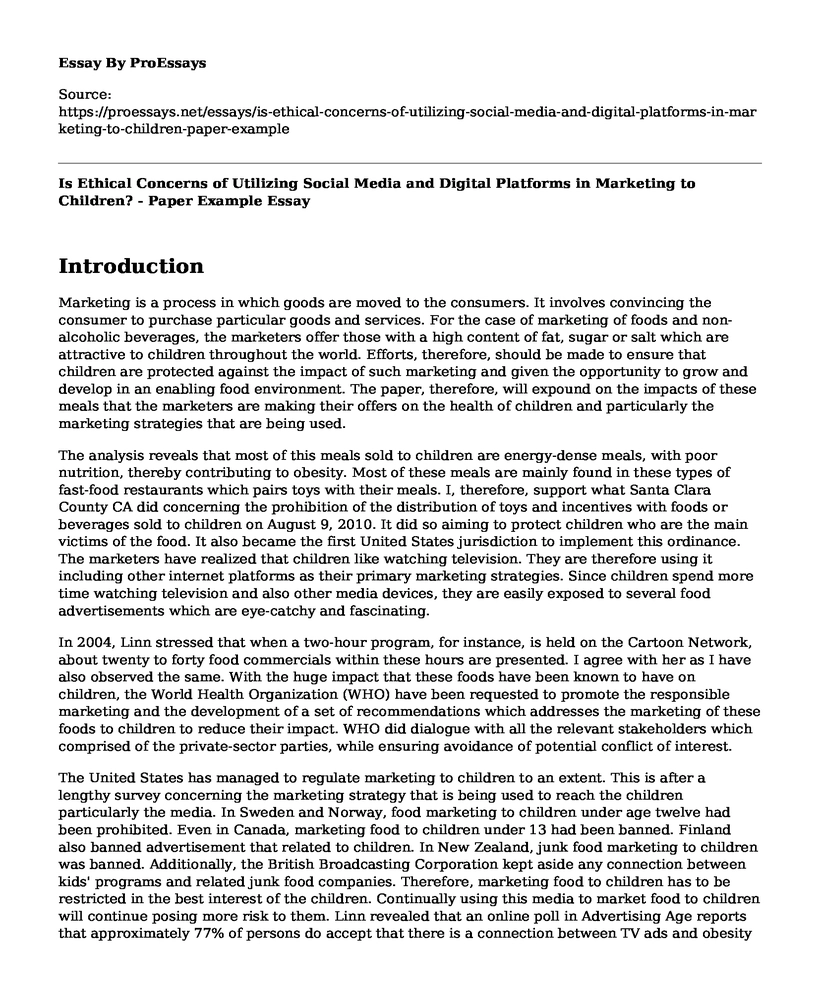Introduction
Marketing is a process in which goods are moved to the consumers. It involves convincing the consumer to purchase particular goods and services. For the case of marketing of foods and non-alcoholic beverages, the marketers offer those with a high content of fat, sugar or salt which are attractive to children throughout the world. Efforts, therefore, should be made to ensure that children are protected against the impact of such marketing and given the opportunity to grow and develop in an enabling food environment. The paper, therefore, will expound on the impacts of these meals that the marketers are making their offers on the health of children and particularly the marketing strategies that are being used.
The analysis reveals that most of this meals sold to children are energy-dense meals, with poor nutrition, thereby contributing to obesity. Most of these meals are mainly found in these types of fast-food restaurants which pairs toys with their meals. I, therefore, support what Santa Clara County CA did concerning the prohibition of the distribution of toys and incentives with foods or beverages sold to children on August 9, 2010. It did so aiming to protect children who are the main victims of the food. It also became the first United States jurisdiction to implement this ordinance. The marketers have realized that children like watching television. They are therefore using it including other internet platforms as their primary marketing strategies. Since children spend more time watching television and also other media devices, they are easily exposed to several food advertisements which are eye-catchy and fascinating.
In 2004, Linn stressed that when a two-hour program, for instance, is held on the Cartoon Network, about twenty to forty food commercials within these hours are presented. I agree with her as I have also observed the same. With the huge impact that these foods have been known to have on children, the World Health Organization (WHO) have been requested to promote the responsible marketing and the development of a set of recommendations which addresses the marketing of these foods to children to reduce their impact. WHO did dialogue with all the relevant stakeholders which comprised of the private-sector parties, while ensuring avoidance of potential conflict of interest.
The United States has managed to regulate marketing to children to an extent. This is after a lengthy survey concerning the marketing strategy that is being used to reach the children particularly the media. In Sweden and Norway, food marketing to children under age twelve had been prohibited. Even in Canada, marketing food to children under 13 had been banned. Finland also banned advertisement that related to children. In New Zealand, junk food marketing to children was banned. Additionally, the British Broadcasting Corporation kept aside any connection between kids' programs and related junk food companies. Therefore, marketing food to children has to be restricted in the best interest of the children. Continually using this media to market food to children will continue posing more risk to them. Linn revealed that an online poll in Advertising Age reports that approximately 77% of persons do accept that there is a connection between TV ads and obesity in children. With this in mind, it is, therefore, necessary that food marketing to children be reasonably banned.
Conclusion
In summary, my research has managed to show that food marketing is immeasurably pervasive in the lives of children and it is a significant detriment to their health status. The States that have banned the promotion of these foods over the television and other social media programs should be fully supported. More policies should be enacted to regulate the advertising of these unhealthy foods to children. Any policy that is being enacted should be understood that it is purposely done for the protection of children.
Cite this page
Is Ethical Concerns of Utilizing Social Media and Digital Platforms in Marketing to Children? - Paper Example. (2022, Jul 14). Retrieved from https://proessays.net/essays/is-ethical-concerns-of-utilizing-social-media-and-digital-platforms-in-marketing-to-children-paper-example
If you are the original author of this essay and no longer wish to have it published on the ProEssays website, please click below to request its removal:
- The Acquisition of LinkedIn by Microsoft Paper Example
- The Mix of Media to Implement Public Relations Campaign Paper Example
- Call the Midwife and the Role of the Nurse Essay
- Essay Sample on Teaching Against Globalization and the New Imperialism: Toward a Revolutionary Pedagogy
- Essay Sample on Gender Disparity in Music Industry: Who Makes the Canon?
- Essay Example on Citi Trends: Home-Oriented Shopping for Middle-Class Urban Customers
- Psychological Stress in University Students: Causes & Effects - Essay Sample







